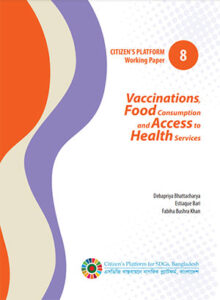 The COVID-19 pandemic has wreaked havoc on the decades of progress achieved by countries on strengthening health and food systems and improving economic conditions of the population. While income losses and high inflation meant less affordability of household’s food and nutrition necessities, supply disruptions caused by movement restrictions prevented the uptake of essential health services. The consequences were especially aggravated for the left behind groups by the pandemic as their old vulnerabilities were exacerbated and new vulnerabilities were formed. In this vein, the study assessed the direct and indirect health implications of the COVID-19 pandemic on the traditionally and newly disadvantaged communities. The direct health impacts are the COVID-19 testing, infections, and hospitalisations, and the indirect implications consist of two dimensions: food security and maternal and child health. Results from a primary survey of 1600 households from 9 disadvantaged groups across eight divisions in Bangladesh indicate significant reduction of food intake, rise in non institutional births and inequalities in COVID-19 vaccine uptake among the traditionally and newly disadvantaged groups.
The COVID-19 pandemic has wreaked havoc on the decades of progress achieved by countries on strengthening health and food systems and improving economic conditions of the population. While income losses and high inflation meant less affordability of household’s food and nutrition necessities, supply disruptions caused by movement restrictions prevented the uptake of essential health services. The consequences were especially aggravated for the left behind groups by the pandemic as their old vulnerabilities were exacerbated and new vulnerabilities were formed. In this vein, the study assessed the direct and indirect health implications of the COVID-19 pandemic on the traditionally and newly disadvantaged communities. The direct health impacts are the COVID-19 testing, infections, and hospitalisations, and the indirect implications consist of two dimensions: food security and maternal and child health. Results from a primary survey of 1600 households from 9 disadvantaged groups across eight divisions in Bangladesh indicate significant reduction of food intake, rise in non institutional births and inequalities in COVID-19 vaccine uptake among the traditionally and newly disadvantaged groups.
Authors: Debapriya Bhattacharya, Estiaque Bari, Fabiha Bushra Khan
Publication Period: July 2023


Leave A Comment